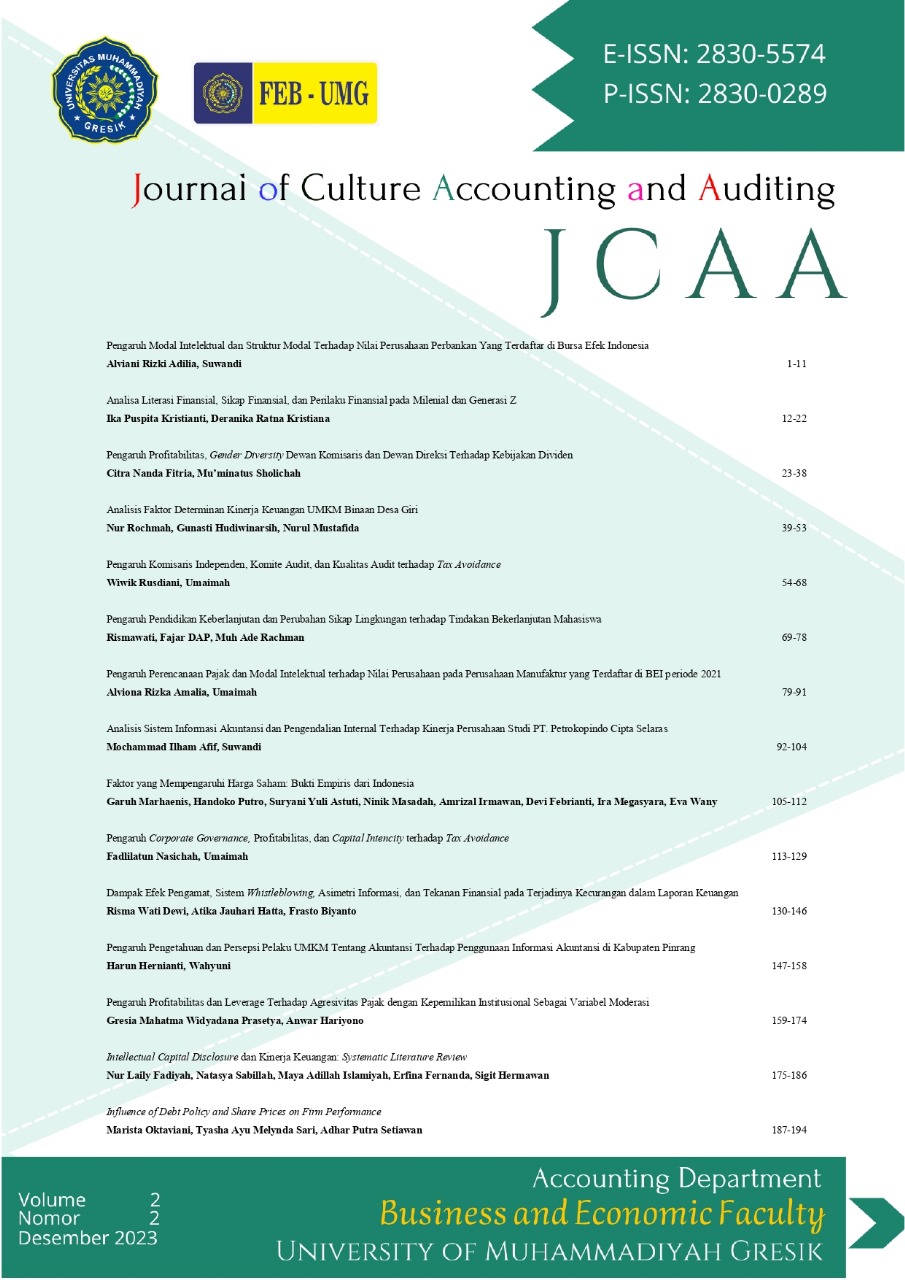Analisa Literasi Finansial, Sikap Finansial, dan Perilaku Finansial pada Milenial dan Generasi Z
DOI:
https://doi.org/10.30587/jcaa.v2i2.6865Keywords:
perilaku finansial; sikap finansial; literasi finansial; sikap terhadap uang; generasi milenial; generasi ZAbstract
This research aims to analyze financial literacy and financial behavior in Indonesia, which specifically aims to find a correlation between the level of financial literacy and financial attitudes towards financial behavior. This research also analyzes and compares the influence of demographic characteristics on financial literacy levels. This research develops financial behavior theory in explaining and predicting the influence of financial literacy and financial attitudes on individual behavior. According to OECD & Lusardi (2019), financial literacy is divided into 3 dimensions, namely financial knowledge, financial attitudes and financial behavior. This research falls into the area of finance, which emphasizes the importance of financial education for individuals. This research uses a survey method containing a questionnaire to collect respondents' responses to indicators of financial literacy, financial attitudes and financial behavior. The results of data collection and processing show that financial literacy and financial attitudes are significantly correlated with individual financial behavior, namely that the level of financial literacy in men is higher than in women, and there is a higher financial attitude in individuals who have an educational background in economics. Considering that data collection uses an online survey, researchers cannot monitor respondents when filling out the questionnaire to ensure respondents' accuracy in filling out the survey. This research can be developed on various other indicators, such as education level, parenting style, and demographic location. In addition, a larger sample size will increase the reliability of the results.
References
Bucher-koenen, T., Alessie, R., & Lusardi, A. (2016). Women , confidence , and financial literacy. Bonn 2013, 1–36.
Cole, S., Sampson, T., & Zia, B. (2009). Financial literacy, financial decisions, and the demand for financial services: evidence from India and Indonesia. Harvard Business School Working Paper 09-117, 1–37. http://www1.worldbank.org/prem/poverty/ie/dime_papers/1107.pdf
Filipiak, U., & Yabibal, M. W. (2015). The Financial Lietarcy Gap: A Question of Nature or Nurture?
Garg, N., & Singh, S. (2018). Financial Literacy among Youth. International Journal of Social Economics, 45(1), 173–186. https://doi.org/10.1108/IJSE-11-2016-0303
Gustman, B. A. L., Steinmeier, T. L., & Tabatabai, N. (2012). Financial Knowledge and Financial Literacy at the Household Level. Aer, 102(3), 309–313.
Herdjiono, I., Damanik, L. A., & Musamus, U. (2016). Pengaruh Financial Attitude, Financial Knowledge, Parental Income terhadap Financial Management,. 3, 226–241.
Lusardi, A. (2019). Financial Literacy and The Need for Financial Education: Evidence and Implications. Swiss Journal of Economics and Statistics, 155(1), 1–8. https://doi.org/10.1186/s41937-019-0027-5
Lusardi, A., & Mitchell, O. S. (2011). Financial literacy around the world: An overview. Journal of Pension Economics and Finance, 10(4), 497–508. https://doi.org/10.1017/S1474747211000448
Lusardi, A., & Mitchell, O. S. (2014). The Economic Importance of Financial Literacy: Theory and Evidence. Journal of Economic Literature, 52(1), 5–44. https://doi.org/10.1257/jel.52.1.5
Nicolini, G., Cude, B. J., & Chatterjee, S. (2013). Financial literacy: A Comparative Study Across Four Countries. International Journal of Consumer Studies, 37(6), 689–705. https://doi.org/10.1111/ijcs.12050
Sohn, S. H., Joo, S. H., Grable, J. E., Lee, S., & Kim, M. (2012). Adolescents’ financial literacy: The role of financial socialization agents, financial experiences, and money attitudes in shaping financial literacy among South Korean youth. Journal of Adolescence, 35(4), 969–980. https://doi.org/10.1016/j.adolescence.2012.02.002
Taft, M. K., Hosein, Z. Z., & Mehrizi, S. M. T. (2013). The Relation between Financial Literacy, Financial Wellbeing and Financial Concerns. International Journal of Business and Management, 8(11), 63–75. https://doi.org/10.5539/ijbm.v8n11p63
Tang, T. L. P. (1995). The development of a short Money Ethic Scale: Attitudes toward money and pay satisfaction revisited. Personality and Individual Differences, 19(6), 809–816. https://doi.org/10.1016/S0191-8869(95)00133-6











.png)


